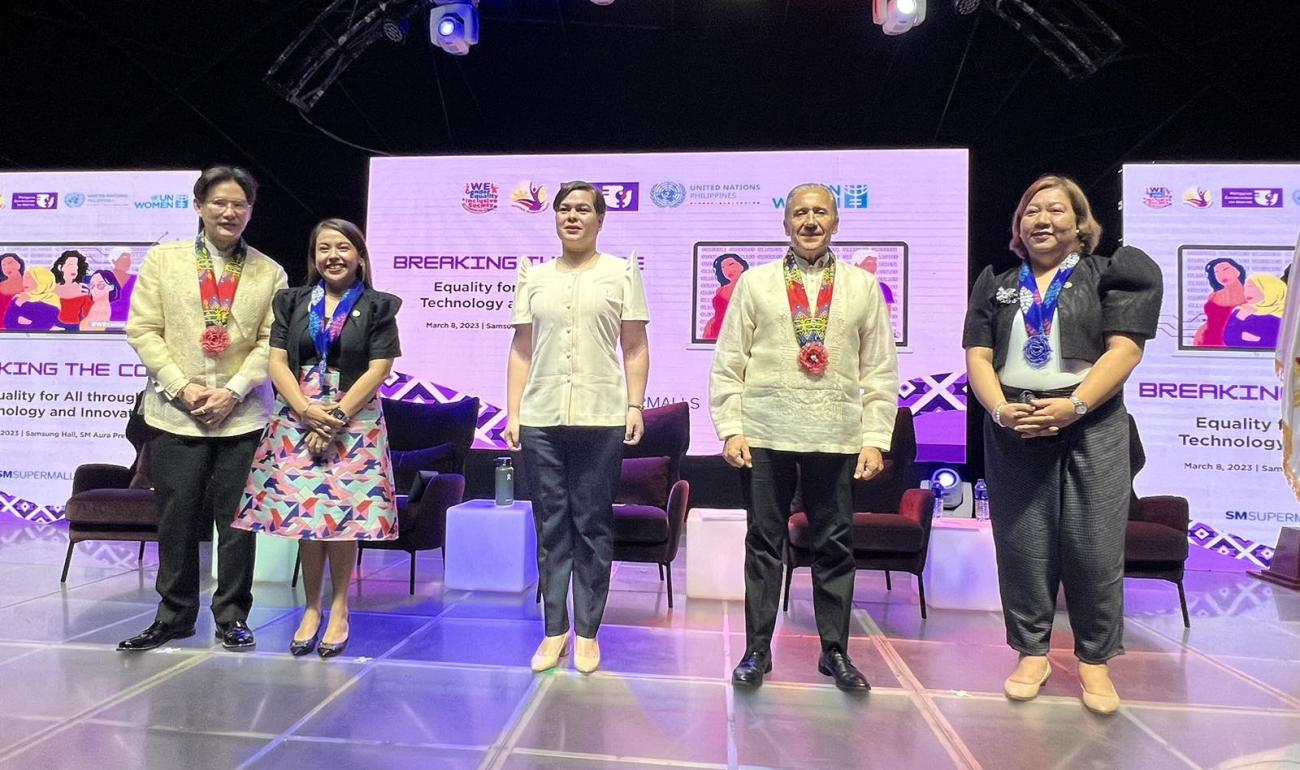On International Women's Day UN Philippines chief calls for inclusive digitalization

Digital technologies cannot be perceived as gender-neutral tools but rather as part of a wider, socio-political context that shapes their design, purpose & use
MANILA, 8 March 2023--The Philippine Commission on Women (PCW) and UN Women organized today a commemorative event for International Women's Day on the theme, “DigitALL: Innovation and technology for gender equality,” at the Samsung Hall of SM Aura Premier in Taguig City. Guest speakers included UN Resident Coordinator Gustavo Gonzalez, Philippines Vice-President Sara Duterte and Philippine Commission on Women executive director Atty Kristine Yuson-Chavez, among others.
The message of the UN Philippines Resident Coordinator, as delivered, follows:
Digital technology has not only changed the way we work, the way we generate knowledge and communicate each other, but also the way we design and build our futures.
When we realize that by 2050, around 90% of our jobs will have a digital-related component or skill, we easily understand the danger of being out of this journey.
Digital technology is the backbone of any development agenda.
But, unfortunately, the benefits of digital technology have come with some risks and shortcomings.
Women are 18 per cent less likely than men to own a smartphone, and far less likely to access or use the internet. This past year alone, 259 million more men than women were online.
In the Asia-Pacific region, despite some progress, a 6 percent gender gap in internet usage still persists.
As we have just learned from the humanitarian response to Odette in the Philippines, the gender digital divide can limit women’s access to life-saving information, mobile money products, agricultural extension, or simply online public services.
The digital gender divide prevents girls from getting access to their daily lessons, to young woman to complete her education, to a rural woman to own her own bank account, to feed her family, or get an employment.
Stereotypes, constructed from a male-dominated society, dangerously portray the digital divide as a matter of women’s and girls’ disinclination towards technology.
As we learn, the real challenge is not necessarily to train more women or distribute more mobile handsets. Rather, it is to fix the institutions and the harmful gender stereotypes surrounding technology and innovation that fail women and girls.
Digital technology can be the game-changers to catalyze poverty reduction, decrease hunger, boost health, create new jobs, mitigate climate change, address humanitarian crises, improve energy access and make entire cities and communities safer and more sustainable – benefitting women and girls. But without equal access to technology and the internet, girls and women are not able to equally participate in our ever more digital societies.
And we are not just referring to women and girls as consumers of digital products, but also as generators of science and technology.
The reason is quite simple: Without the insights and creativity of half the world, science and technology will fulfil just half their potential.
Digital technologies cannot be perceived as gender-neutral tools but rather as part of a wider, socio-political context that shapes their design, purpose and use.
There are at least three ways that we can do this immediately:
Number One: Education remains a powerful instrument to fix the gender digital divide. The objective is to continue integrating gender equality at the heart of education sector plans, budgets and policies. Integrate a human rights-based approach in computer science and engineering secondary and tertiary curricula and ensure universal digital literacy for education and other empowering purposes. A number of UN agencies are already working in such sense – UNICEF, UNESCO, UNFPA, UNWOMEN-.
Number Two: We have to bring technology and connectivity much closer to women and other marginalized groups. Some countries started incentivizing operators to establish differentiated pricing arrangements and reduced tariff data plans to facilitate women’s connectivity. Create policies and programs that facilitate access or subsidize digital devices for women and girls and create enabling environments for the private delivery of digital public goods and the development of community networks. UNDP, UNIDO, WFP, UNHABIT are bringing their support to affordable digital technology.
Number Three: If the future of the work is fully shaped by ICT skills, we have to generate the appropriate labor market policies, including gender-responsive employment policies, skills anticipation and development to facilitate a gender-based transition to new occupations and jobs, or to change demands within existing jobs and integrate reskilling as part of automation processes. (ILO, IOM, UNDP, WB, ADB will be key supporters of the Philippines Development Plan in this area).
This debate is very timely as the United Nations in the Philippines is currently undertaking -together with the Philippine Government and development partners- the formulation of the UN Sustainable Development Framework for the period 2024 to 2028. This framework is a central instrument for providing a coordinated, coherent and strategic direction for all UN entities at country level.
In this context, inclusive digitalization and gender equality will be a cross-cutting theme across all the outcome areas that the new framework will seek to achieve. The intersection of these two dimensions is critical to the success of the cooperation framework.
Before I end my message, I would like to reiterate that it is not enough to just claim for more digitalization. We need to also generate the right policies and strategies to ensure that women and girls benefit from such historic investment.
In the Philippines, the UN is closely working with the Government to ensure women’s full access to the digital economy. We are aligning our capacities and forces to the new Philippines Development Plan to better serve Filipino people and leave no one behind.
By closing the “gender digital divide” we will together build a more resilient and inclusive society.
Thank you!


